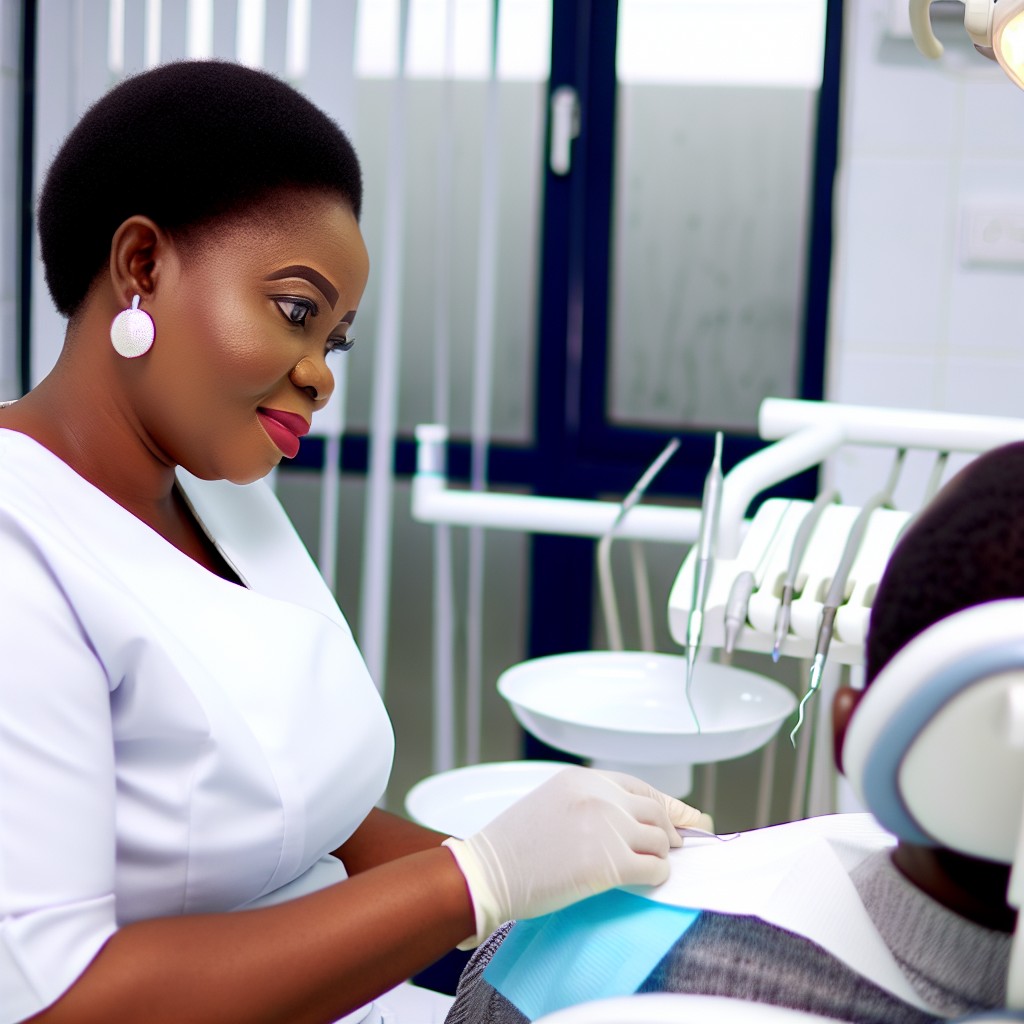Introduction
Restorative dentistry refers to the branch of dentistry focused on repairing and restoring the function and appearance of teeth.
It involves various treatments and procedures such as fillings, crowns, bridges, and implants.
Oral health is crucial for overall health as it can impact digestion, speech, and self-esteem.
Poor oral health has been linked to systemic conditions like heart disease and diabetes.
Restorative Dentistry and Oral Health
The connection between oral health and overall health is significant.
Poor oral health can have a direct impact on systemic diseases.
Fortunately, restorative dentistry plays a crucial role in improving oral health.
Importance of Oral Health
- Good oral health is a fundamental aspect of overall well-being.
- It can prevent various oral health issues such as cavities, gum disease, and tooth loss.
- Proper oral hygiene practices, including regular dental check-ups, are essential for maintaining oral health.
Impact of Poor Oral Health on Systemic Diseases
- Poor oral health has been linked to systemic diseases such as cardiovascular disease and diabetes.
- Periodontal disease, a severe form of gum disease, can contribute to the development of heart disease.
- Research has shown that oral bacteria from gum disease can enter the bloodstream and affect other parts of the body.
Role of Restorative Dentistry in Improving Oral Health
- Restorative dentistry focuses on restoring the function and aesthetics of the teeth and gums.
- Treatments such as dental fillings, crowns, bridges, and implants help repair damaged teeth and restore oral health.
- Restorative dentistry also addresses issues like tooth decay, tooth loss, and misaligned teeth to improve overall oral health.
The impact of restorative dentistry on overall health cannot be overstated.
By maintaining good oral health through restorative dentistry, individuals can prevent systemic diseases and improve their quality of life.
Impact of Dental Issues on Eating Habits
Dental issues can significantly impact a person’s ability to chew and digest food.
Problems such as missing teeth, cavities, or misaligned teeth can lead to discomfort or pain while eating.
This discomfort can result in avoiding certain types of food or not fully enjoying meals.
How Restorative Dentistry Improves Eating Habits
Restorative dentistry procedures help individuals overcome these challenges improving their eating habits.
By addressing dental issues through treatments like dental implants, crowns, bridges, or dentures, patients regain the ability to chew properly.
This leads to maintaining good oral health.
Examples of Positive Impact of Restorative Dentistry
- A patient with missing teeth can have dental implants placed, allowing them to comfortably eat a variety of foods without restrictions.
- Individuals with cavities can undergo fillings or root canal treatments to restore their teeth and prevent further decay, enabling them to enjoy meals without pain.
- Patients with misaligned teeth can benefit from braces or aligners to correct their bite, improving their chewing function and overall eating experience.
Restorative dentistry enhances the aesthetics of a smile and promotes better eating habits and overall health.
By addressing dental issues promptly and effectively, individuals can enjoy a varied and nutritious diet.
This improved diet leads to enhanced quality of life.
Learn More: Addressing Cleft Lip and Palate in Nigerian Surgeries
Dental Problems and Mental Health
Having dental problems can significantly impact a person’s mental health by affecting their self-esteem and confidence.
When someone has missing, discolored, or misaligned teeth, they may feel self-conscious about their appearance.
This can lead to feelings of insecurity and low self-worth.
Furthermore, dental issues can cause pain and discomfort, leading to stress and anxiety.
The fear of judgment from others due to oral problems can also contribute to social anxiety and isolation.
All these factors combined can have a negative impact on a person’s mental well-being.
Restorative Dentistry’s Role in Improving Mental Health
Restorative dentistry plays a crucial role in improving a person’s mental health by addressing dental problems effectively.
By restoring or enhancing the appearance of teeth through treatments like dental implants, veneers, or braces, individuals can regain their confidence and self-esteem.
When people feel better about their smiles, they are more likely to engage in social activities.
This can boost their mental well-being and overall quality of life.
Restorative dentistry not only enhances physical appearance but also uplifts mental health.
Stories and Studies Demonstrating the Link
- One study published in the Journal of Dentistry found that individuals who underwent restorative dental treatments reported a significant improvement in their self-esteem and emotional well-being.
- A patient named Emily shared her experience of getting dental implants after years of hiding her smile. She noted a positive shift in her confidence levels and mental health post-treatment.
- Another study conducted by the American Dental Association showed that individuals with restored teeth were more likely to feel confident in social interactions and experience reduced levels of anxiety.
The connection between restorative dentistry and mental health is undeniable.
By addressing dental issues and improving the aesthetics of a person’s smile, restorative dentistry can have a profound impact on their self-esteem, confidence, and overall mental well-being.
Investing in dental treatments not only enhances oral health but also uplifts mental health, leading to a happier and more fulfilling life.
Discover More: The Role of Technology in Nigerian Ophthalmology Practices
Restorative Dentistry and Chronic Pain
Dental issues can lead to chronic pain in the jaw, head, and neck due to untreated decay or misalignment.
Restorative dentistry treatments such as fillings, crowns, and bridges can help alleviate chronic pain by addressing the root cause.
- Fillings: Sealing off cavities prevents further decay that can cause pain.
- Crowns: Covering and protecting damaged teeth can relieve pain from sensitivity or fractures.
- Bridges: Replacing missing teeth restores proper bite alignment, reducing strain on surrounding muscles.
One success story involves a patient who suffered from chronic jaw pain due to a misaligned bite.
After receiving a dental bridge to replace a missing tooth, the patient experienced significant relief from jaw discomfort and headaches.
Another patient had severe neck pain caused by grinding teeth at night.
Transform Your Career with Expert Guidance
Get personalized mentorship consulting that’s tailored to your unique path. Our expert advice is actionable and exclusive.
Get StartedWith the help of custom-made night guards, the patient no longer wakes up with neck stiffness and pain.
- Night Guards: Protecting teeth from grinding can prevent headaches and muscle tension in the jaw and neck.
- Jaw Reconstruction: Correcting misaligned jaws can alleviate pain and improve overall oral function.
- Orthodontic Treatment: Straightening teeth can redistribute bite forces, reducing strain on jaw muscles.
Restorative dentistry plays a crucial role in addressing chronic pain associated with dental issues.
By seeking timely treatment and proper care, patients can experience relief and improve their overall quality of life.
Delve into the Subject: Community Health Initiatives in Nigeria

Restorative dentistry plays a crucial role in enhancing a person’s overall quality of life.
Addressing dental issues through restorative dentistry can significantly improve an individual’s well-being.
Improved Oral Health and Better Physical Health
- Restorative dentistry helps in restoring damaged teeth, improving chewing ability, and enhancing speech.
- By addressing oral health problems promptly, restorative dentistry can prevent infections and complications.
- Healthy teeth and gums contribute to better overall physical health and reduce the risk of systemic diseases.
Positive Impact on Well-Being
- Individuals who undergo restorative dental treatments report improved self-esteem and confidence.
- Enhanced oral health leads to better social interactions and a more positive self-image.
- People with a healthy smile are more likely to smile often, which can improve mood and overall well-being.
Statistics and Testimonials
- According to a study by the American Dental Association, 90% of patients reported improved quality of life after restorative dental procedures.
- Testimonials from patients who have undergone restorative dentistry highlight the transformative impact on their overall happiness.
- Statistics show that individuals who prioritize their oral health through restorative dentistry have lower rates of chronic illnesses.
Explore Further: Tips for New Parents in Nigeria
Implications of Restorative Dentistry on Health
Restorative dentistry plays a crucial role in enhancing overall health by restoring proper function and aesthetics of the teeth.
Oral health is closely linked to various systemic health issues, highlighting the significance of maintaining good oral hygiene.
Restorative dentistry treatments such as fillings, crowns, and implants not only improve the appearance of the teeth but also prevent further dental complications.
Addressing dental problems promptly through restorative dentistry can prevent issues like gum disease and tooth loss, thus safeguarding overall well-being.
Individuals must prioritize their oral health and seek restorative dentistry treatments when needed to ensure a better quality of life.
Regular dental check-ups and cleanings, along with timely restorative interventions, significantly contribute to maintaining optimal oral health and overall well-being.
It is crucial to understand the beneficial impact of restorative dentistry on health and take proactive steps to care for oral health.
Investing in restorative dentistry is not just about aesthetics but also about promoting a healthy mouth, body, and mind.
Let’s make oral health a priority and consider restorative dentistry as a valuable tool in achieving and maintaining overall health and well-being.
Additional Resources
Periodontal Diseases in Adult and Elderly Nigerians: A National …
Prevalence of Complete Edentulism in Adults and Older Nigerian …




